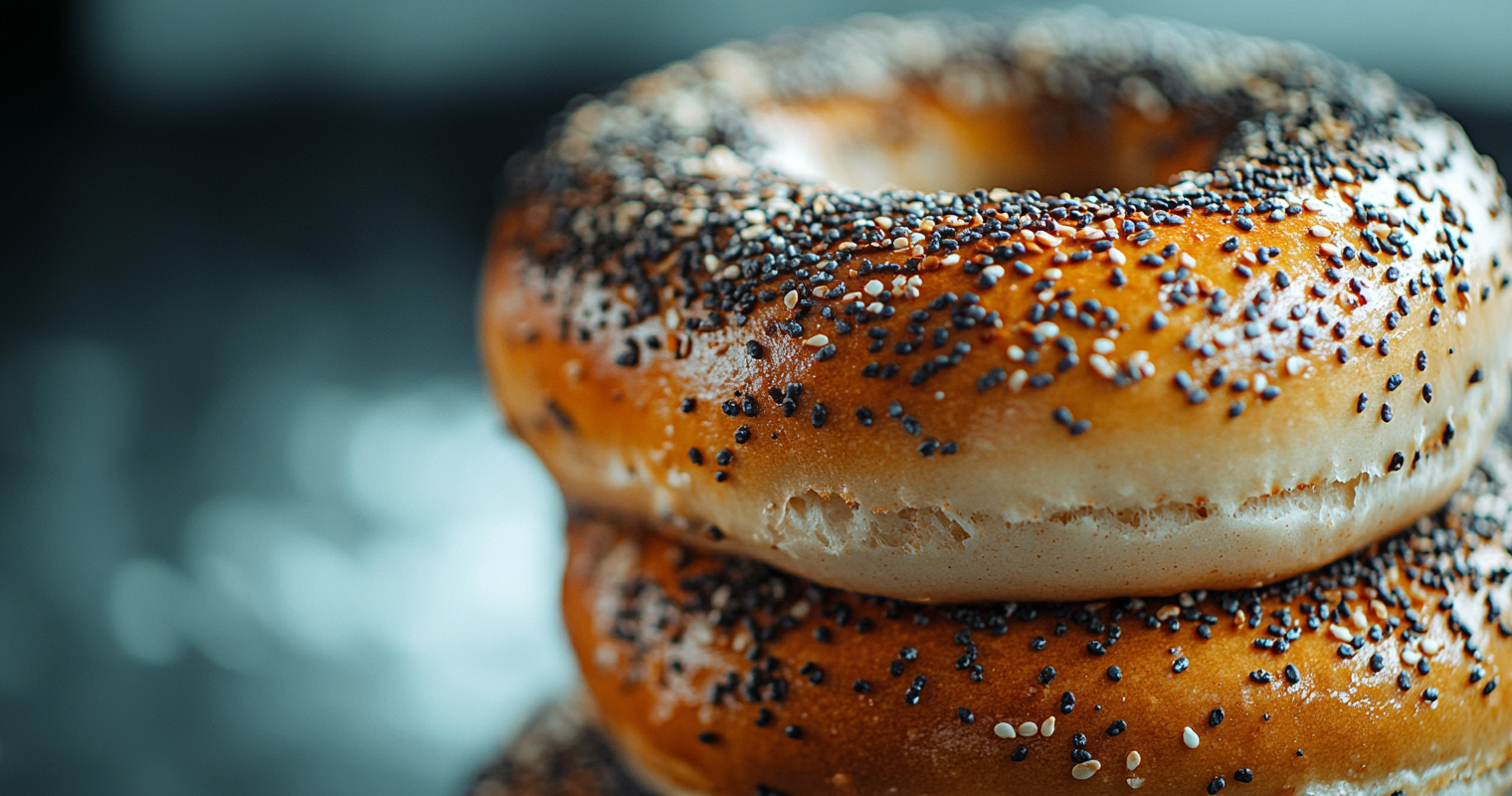The everything bagel is one of the most popular bagel varieties across the globe, known for its mix of savory toppings like garlic, onion, sesame, and poppy seeds. Its bold flavors and crunchy texture have made it a staple at breakfast tables, cafes, and bagel shops. However, with its increasing popularity comes the inevitable question: Is everything bagel healthy?
In this post, we’ll take a deep dive into the nutritional content of the everything bagel, discuss its benefits and drawbacks, and explore ways to make it healthier. By the end, you’ll have a clear understanding of whether the everything bagel is a good fit for your diet and how you can still enjoy it while keeping health in mind.
1. What Exactly Is in an Everything Bagel?
To determine whether an everything bagel is healthy, it’s essential first to understand what exactly goes into this beloved bagel. The everything bagel gets its name because it combines several popular bagel toppings, offering a mix of flavors and textures in every bite. But what are these toppings, and do they offer any health benefits?
Common Ingredients on an Everything Bagel
The typical everything bagel includes:
- Garlic flakes – Rich in flavor and known for its anti-inflammatory properties.
- Onion flakes – Contains vitamins and antioxidants that can promote heart health.
- Sesame seeds – A source of healthy fats, fiber, and minerals like calcium.
- Poppy seeds – Provide a mild flavor and a good amount of essential minerals like zinc and iron.
- Kosher salt – Used sparingly to enhance the flavor.
While these toppings offer some nutritional value, the base of the everything bagel is made from refined white flour. This flour, unfortunately, lacks the fiber and nutrients found in whole grains, which can make the bagel less filling and more calorie-dense.
For a more detailed breakdown of what’s in an everything bagel, you can check out this Ultimate Guide to Everything Bagels.
2. Nutritional Breakdown of an Everything Bagel
Let’s take a closer look at the nutritional content of a standard everything bagel. On average, one plain everything bagel (without any spreads or toppings) contains the following:
- Calories: 280-350 (depending on size)
- Carbohydrates: 50-60 grams
- Protein: 10-12 grams
- Fat: 1-2 grams
- Fiber: 1-3 grams
- Sodium: 400-600 mg
High in Calories and Carbohydrates
A typical everything bagel is high in carbohydrates, providing 50-60 grams per serving. While carbs are an essential source of energy, refined carbs from white flour can lead to quick spikes in blood sugar levels. This may leave you feeling hungry soon after eating, as refined carbs don’t offer the sustained energy that whole grains provide.
Additionally, the calorie content of a everything bagel can add up, especially if you add cream cheese or butter, which are common accompaniments. These spreads can quickly turn an already calorie-dense meal into one that is high in fat and calories.
Low in Fiber
One of the main concerns with the everything bagel is its low fiber content. Because it’s typically made from refined white flour, it lacks the dietary fiber found in whole grains. Fiber is essential for digestion, helps regulate blood sugar, and can keep you feeling fuller for longer.
For those looking to make their bagels more filling and nutrient-dense, choosing whole grain bagels can be a better option. These bagels provide more fiber, helping you stay satisfied throughout the day.
3. The Downside of Refined Carbs
One of the biggest nutritional concerns with everything bagels is that they are made from refined carbohydrates. When grains are refined, they are stripped of their fiber, vitamins, and minerals, leaving only the starchy endosperm. As a result, refined carbs digest quickly, which can lead to blood sugar spikes and crashes.
Refined Carbs and Health Concerns
According to health experts, foods made with refined white flour, like bagels, can contribute to weight gain, especially when consumed in excess. They lack the satiety and nutritional benefits that come with whole grains. Moreover, refined carbs can increase the risk of developing type 2 diabetes, heart disease, and other chronic health conditions.
If you’re watching your carbohydrate intake or concerned about the effects of refined carbs, it may be best to limit your consumption of white bagels and opt for healthier alternatives. For more details on the impact of refined carbs, check out this Joy Bauer article.
4. Is Everything Bagel Healthy? The Short Answer
The answer to whether the everything bagel is healthy depends largely on the context of your overall diet and how frequently you consume it. While an everything bagel can certainly fit into a balanced diet when eaten occasionally, it’s not the healthiest choice for daily consumption due to its high carbohydrate content, low fiber, and refined flour base.
However, this doesn’t mean you need to avoid everything bagels entirely. Instead, it’s about moderation and making healthier choices when possible. Below, we’ll explore some tips to enjoy an everything bagel while keeping your health in mind.
5. How to Make Everything Bagels Healthier
If you love everything bagels but want to make them a healthier part of your diet, there are several ways to do so. These strategies allow you to enjoy your favorite bagel while cutting back on calories, carbohydrates, and refined ingredients.
1. Opt for Whole Grain or Multigrain Bagels
One of the easiest ways to make an everything bagel healthier is to choose a whole grain or multigrain version. Whole grain bagels contain more fiber than their refined counterparts, which helps to slow digestion and keep you full for longer. Additionally, whole grains are rich in nutrients like B vitamins, iron, and magnesium, which are stripped away during the refining process.
Switching to a whole grain everything bagel can improve your blood sugar control, provide sustained energy, and support heart health. If your favorite bagel shop doesn’t offer whole grain options, consider making your own everything bagels at home using whole wheat flour.
2. Control Portion Sizes
Another way to enjoy an everything bagel without overindulging is by controlling your portion sizes. Bagels in most stores and cafes tend to be quite large, often exceeding the recommended portion size for a serving of grains.
To reduce your calorie and carbohydrate intake, try eating half a bagel instead of a whole one. Pair it with a source of protein, such as eggs or Greek yogurt, to make the meal more balanced and filling.
3. Choose Healthier Spreads
The toppings you choose for your everything bagel can significantly impact its nutritional value. While cream cheese and butter are common choices, they are high in fat and calories, which can quickly turn a bagel into a high-calorie meal.
Instead, opt for healthier spreads like mashed avocado, hummus, or low-fat Greek yogurt. These options add healthy fats and protein to your meal, making it more balanced and satisfying without overloading on calories.
For more information on how to customize your bagel with healthy spreads, check out this guide to everything bagels.
6. The Benefits of Everything Bagel Toppings
While the base of an everything bagel may not be the healthiest choice due to the refined flour, the toppings can offer some nutritional benefits. The mix of garlic, onion, sesame, poppy seeds, and salt not only enhances the flavor but also provides some essential nutrients.
Garlic and Onion
Both garlic and onion are rich in vitamins, minerals, and antioxidants. They contain compounds that have been shown to reduce inflammation and promote heart health. While the amount of garlic and onion on a bagel is small, every bit adds to the overall nutritional value.
Sesame and Poppy Seeds
Sesame and poppy seeds are excellent sources of healthy fats, including omega-6 fatty acids. They also provide a small amount of protein, fiber, and important minerals like calcium, magnesium, and zinc. Incorporating seeds into your diet can contribute to bone health and help regulate blood sugar levels.
The Downside: Salt
While the seeds and flakes on an everything bagel offer some nutritional value, the added salt can be a concern for those watching their sodium intake. One everything bagel can contain between 400-600 mg of sodium, which is a significant portion of the recommended daily intake of 2,300 mg.
If you’re trying to reduce your sodium consumption, you might want to limit your intake of everything bagels or choose lower-sodium toppings.
7. Comparing Everything Bagels to Other Bagel Varieties
How does the everything bagel stack up against other popular bagel varieties in terms of health? Let’s compare it to some common alternatives.
Plain Bagel
A plain bagel made from refined white flour is quite similar to an everything bagel in terms of calories and carbs. However, the lack of toppings means it offers fewer nutrients. If you’re choosing between a plain bagel and an everything bagel, the latter may be the better choice for flavor and nutrients from the toppings.
Whole Wheat Bagel
Whole wheat bagels are made from unrefined flour, which retains the fiber and nutrients lost in the refining process. This makes them a healthier option compared to both plain and everything bagels. They are more filling and help stabilize blood sugar levels, making them ideal for those who want to avoid blood sugar spikes.
Multigrain Bagel
Multigrain bagels are made from a combination of different grains and seeds, making them a nutrient-dense choice. They offer more fiber and a broader range of vitamins and minerals than traditional everything bagels. Like whole wheat bagels, they help keep you fuller for longer and are a better option for those looking to increase their fiber intake.
8. FAQs About the Healthiness of Everything Bagels
Are everything bagels fattening?
Everything bagels can be fattening if consumed in large quantities or paired with high-calorie spreads like cream cheese or butter. However, by controlling portion sizes and choosing healthier toppings, you can enjoy them in moderation as part of a balanced diet.
Can I eat everything bagels on a low-carb diet?
Because everything bagels are made from refined white flour, they are high in carbohydrates and may not be suitable for a low-carb diet. However, you can find low-carb or keto-friendly bagel alternatives that use almond flour or other low-carb ingredients.
Is everything bagel seasoning healthy?
Everything bagel seasoning, which consists of garlic, onion, sesame seeds, poppy seeds, and salt, can be a healthy addition to your diet when used in moderation. The seeds provide healthy fats and essential minerals, while garlic and onion offer vitamins and antioxidants. However, be mindful of the sodium content in the seasoning.
9. Final Verdict: Is Everything Bagel Healthy?
So, is the everything bagel healthy? While the answer depends on how you incorporate it into your diet, the everything bagel can certainly fit into a balanced eating plan when enjoyed in moderation. The refined flour base makes it less nutritious than whole grain alternatives, but the toppings provide some health benefits, and you can make simple swaps to improve its nutritional profile.
By choosing whole grain or multigrain bagels, controlling portion sizes, and opting for healthier spreads, you can continue enjoying everything bagels while supporting your overall health goals.
For more tips on how to make your everything bagel healthier, check out this Ultimate Guide to everything bagels.

